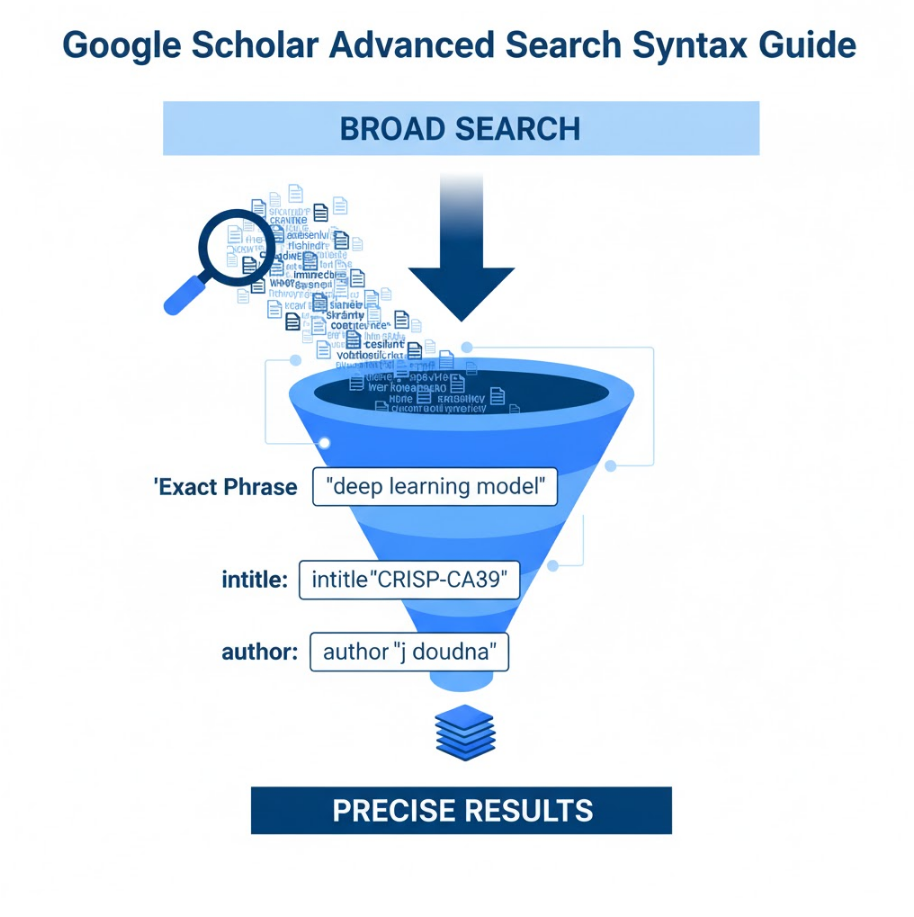

739 views||Release time: Oct 20, 2025
Every researcher knows Google Scholar. You type in a few keywords and get thousands of results. But sifting through this mountain of information to find the few truly relevant papers can be frustrating and time-consuming. This is where learning Google Scholar's advanced search syntax becomes essential.
By using a few simple commands, you can transform your generic search into a precision tool, allowing you to find specific papers, filter out noise, and uncover research with much greater efficiency. This guide will walk you through the most useful syntax to level up your literature search skills.

Before diving into manual commands, it's worth knowing that Google Scholar has a built-in "Advanced Search" page that can help you learn the syntax.
Click the menu icon (☰) in the top-left corner of the Google Scholar homepage.
Select "Advanced search."
This page gives you fields to search for exact phrases, authors, specific journals, and date ranges. When you complete these fields and search, look at the search bar on the results page. You will see the exact syntax Google Scholar uses, which is a great way to learn.
Typing these commands directly into the search bar is faster and more flexible. Here are the essential operators you need to know.
1. " " (Exact Phrase)
This is the single most important operator. It tells Google Scholar to search for the words exactly as you typed them, in that specific order.
Without quotes: deep learning model will find papers that contain the words "deep," "learning," and "model" anywhere in the document, not necessarily together.
With quotes: "deep learning model" will only find papers that contain that exact three-word phrase.
Usage: Always enclose your core concepts in quotes for precision.
2. author: (Search by Author)
This operator restricts your search to papers written by a specific author.
Example: author:"y le cun"
Pro Tip: Be specific. To avoid ambiguity, use the author's full name if you know it, or initials. Try different variations if you're unsure (e.g., author:"yann le cun" or author:"y lecun").
3. intitle: (Search in the Title)
This powerful operator finds papers where your keyword appears in the title of the article. This is a great way to find papers where your topic is the central theme, not just a passing mention.
Example: intitle:"carbon nanotube" will find papers with "carbon nanotube" in the title.
Note: You can use this without quotes (intitle:carbon) to find titles containing that single word.
4. source: (Search in a Specific Publication)
Use this to find articles from a particular journal, conference, or publication source.
Example: source:"Nature" or source:"CVPR"
Usage: Excellent for checking what a specific, high-impact journal has published on your topic.
5. OR (Boolean Operator)
The OR operator (must be in all caps) allows you to search for synonyms or related concepts simultaneously.
Example: "electric vehicle" OR "EV" will find papers that mention either term.
Usage: Broadens your search to capture more relevant literature.
6. - (Exclusion Operator)
The minus sign allows you to exclude results containing a specific term. This is incredibly useful for filtering out noise.
Example: apple -fruit is the classic example. In an academic context, you might search for "neural network" -review to find original research papers while excluding literature review articles.
The true magic happens when you combine these operators to create a highly specific query.
Scenario: You want to find research papers (not reviews) about CRISPR-Cas9 published in the journal Science by Jennifer Doudna.
Your query would be:
intitle:"crispr cas9" -review source:"Science" author:"j doudna"
Let's break this down:
intitle:"crispr cas9": The paper must have "crispr cas9" in its title.
-review: It must not contain the word "review."
source:"Science": It must be from the journal Science.
author:"j doudna": Jennifer Doudna must be one of the authors.
This single search query will give you a small, highly targeted, and incredibly relevant list of results that would have been impossible to find with a simple keyword search.
| Syntax | Function | Example |
"phrase" | Searches for the exact phrase. | "machine learning" |
author:"name" | Finds papers by a specific author. | author:"d silver" |
intitle:"word" | Finds papers with the word in the title. | intitle:"graphene" |
source:"journal" | Finds papers from a specific publication. | source:"Nature" |
OR | Searches for A or B. | "solar cell" OR "photovoltaic" |
-word | Excludes papers that contain the word. | transformer -review |
Conclusion
Learning these simple commands can dramatically improve the quality and efficiency of your literature searches. By moving beyond basic keywords and using Google Scholar's powerful syntax, you can spend less time searching and more time reading the research that truly matters.阿